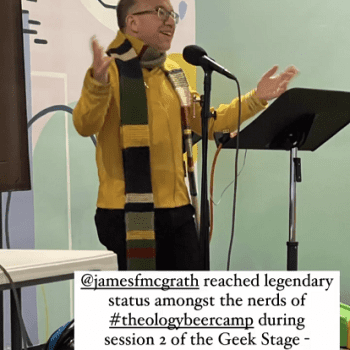Crystal St. Marie Lewis blogged about a mantra that is associated with Joel Osteen, suggesting that the following is a better alternative:
This is my Bible.
I am a witness to what it says, and a student of why it says what it says.
I can do as much research as I wish on the origins and intended uses of these texts.
Today, I understand that my biases impact my perception of what God’s Word is, versus what these words are,
However, I humbly and boldly confess:
My mind is alert and my heart is receptive, as I seek a message that will shatter my biases.
We will never be the same, because we seek a story that will make us all whole.
Others have used these texts irresponsibly in the past, but we will never make that mistake.
Never, never, never.
We will never be the same.
In Jesus name. Amen.
She also shared this insightful quote from a recent article by Reza Aslan:
I think the principle fallacy of not just to the so-called New Atheists, but I think of a lot of critics of religion, is that they believe that people derive their values, their morals, from their religion. That, as every scholar of religion in the world will tell you, is false.
People don’t derive their values from their religion — they bring their values to their religion. Which is why religions like Judaism, Hinduism, Christianity, [and] Islam, are experienced in such profound, wide diversity. Two individuals can look at the exact same text and come away with radically different interpretations. Those interpretations have nothing to do with the text, which is, after all, just words on a page, and everything to do with the cultural, nationalistic, ethnic, political prejudices and preconceived notions that the individual brings to the text. That is the most basic, logical idea that you could possibly imagine, and yet for some reason, it seems to get lost in the incredibly simplistic rhetoric around religion and the lived experience of religion.
…And to me, there’s a shocking inability to understand what, as I say, a child would understand, which is that religions are neither peaceful nor violent, neither pluralistic nor misogynistic — people are peaceful, violent, pluralistic, or misogynistic, and you bring to your religion what you yourself already believe.












